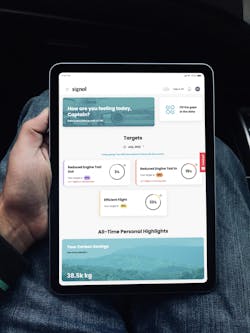Virgin Atlantic Saves 1,000 Tonnes of Fuel in Industry-Leading Pilot Led Program
Virgin Atlantic captains have saved the equivalent of 1,000 tonnes of fuel in under six months using Signol, a behavioral economics and data science app designed to reduce fuel usage and carbon emissions.
The Signol platform uses data analysis to provide recommendations on a personalized basis on how to fly most efficiently from a fuel burn perspective. Captains are provided with individual feedback to reduce fuel usage based on optimized fuel efficiency behaviors, whilst complying with all standards of fuel management and flight safety.
Virgin Atlantic operates one of the youngest, cleanest, twin engine fleets in the skies and the roll out the Signol software earlier this year forms part of the airline’s commitment to reducing carbon.
Corneel Koster, chief customer and operating officer, Virgin Atlantic said: “We’ve been on a pathway to reduce fuel and carbon in our fuel efficiency program for over a decade, whilst always looking for innovations that take us to the next level. The Signol software uses data science and behavioral economics to assist our captains in making the most sustainable choices to reduce carbon emissions and fuel burn. In addition to our multi-billion dollar investment in fleet transformation to ensure we are operating one of the youngest, cleanest fleets, we continue to invest in innovation and technology partners across the industry who help us on our mission to create a low carbon future at pace. Signol’s ability to deliver further fuel reductions assists us in continuously moving the dial.”
Natasha Gedge, COO, Signol said: “The aviation industry is demanding environmental solutions that aren’t capital intensive and slow-moving. We’re delighted to be working with Virgin Atlantic to deliver just that - the equivalent to £1m in fuel saved in a matter of months. There is so much work going into decarbonizing the aviation industry, but developing new technologies and fuels takes time. Signol helps businesses tweak behaviors to reduce carbon emissions from day one and achieve meaningful fuel savings in a matter of months through behavior change alone.”
The three-year deal between Virgin Atlantic and Signol follows the success of an initial pilot study in 2014 in which 24,000 metric tons of CO2 was saved across an 8-month period.
Virgin Atlantic achieved a 17 percent reduction in CO2 per RTK by 2019 by modernizing its fleet and improving its operational efficiency and has committed to a 15 percent gross reduction in CO2 per RTK by 2026 through continued fleet transformation and operational efficiency gains.
The airline’s recent introduction of up to sixteen A330-900neo aircraft will see an 11 percent fuel and carbon saving compared to the A330-300s they replace, and a 50 percent reduction in airport noise contour.


